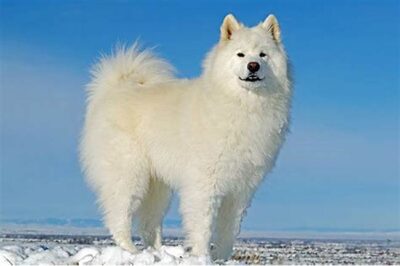The Samoyed nicknamed the “Smiling Sammies,” is a well-loved breed renowned for its friendly and loving personality. Their thick, fluffy white coats and soft demeanor make them ideal pets for families and individuals seeking a faithful companion. In this article, we will delve into the distinct characteristics of the Samoyed temperament and uncover why they are a beloved breed amongst pet owners.
Samoyeds are known for their friendly, gentle, and playful temperament. They are affectionate and good-natured dogs, often referred to as “Smiling Sammies” due to how their mouths curl up in a smile.
They are typically good with children and other pets and are loyal and obedient to their owners. However, they can be somewhat reserved or aloof with strangers and prone to barking. With proper training and socialization, Samoyeds make wonderful family pets.
In addition to their friendly and playful personality, Samoyeds are also known for their intelligence and trainability. They were initially bred as herding and sled dogs, so they have a strong work ethic and enjoy having a job to do. They are also active and energetic dogs, so they need plenty of physical and mental stimulation to stay happy and healthy. This can include regular exercise, training sessions, and interactive toys.
Samoyed temperament
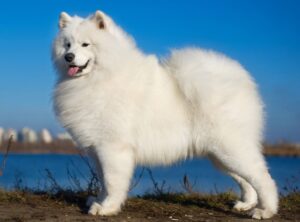
The Samoyed is known for being a friendly and affectionate breed. They are gentle and good with children and are also known for being protective of their families. They have a cheerful and sociable personality and are known for their love of play. Samoyeds are also intelligent and eager to please, which makes them easy to train.
In addition to the traits mentioned earlier, Samoyeds are also known for their independent streak. They have a strong-willed personality and can be pretty determined when they want something. They were originally bred as working dogs and had a strong instinct to herd and protect their flocks.
This herding instinct can sometimes cause them to chase small animals and children, so proper training and socialization are essential to prevent this behavior. They also have a strong urge to bark and can become excessive barkers if not trained properly. Samoyeds are generally good with other pets and dogs despite their independent streak.
Are Samoyeds good with children?
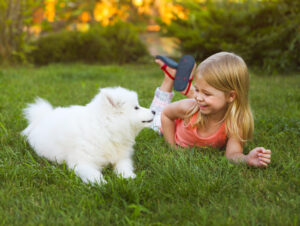
Samoyeds are generally good with children. They are known for being friendly, affectionate, and gentle, and they have a cheerful and playful personalities that can be a lot of fun for kids. They are also protective of their families, which can make them good watchdogs.
However, as with any breed, it’s important to supervise interactions between young children and dogs to ensure their safety. It’s also essential to train and socialize Samoyeds properly so that they understand how to behave around children and other people.
Samoyeds tend to be very tolerant and patient with children, making them a popular choice for families. They are also generally easy-going and non-aggressive, which can make them great playmates for kids.
Moreover, some Samoyeds may be more reserved around children and need to be more comfortable with rough play. As with all breeds, early socialization and training can help your Samoyed get along well with children and other people.
It’s also important to teach children how to treat dogs properly and respect their boundaries, to ensure a happy and harmonious relationship between the dog and the children. In general, with proper care and attention, Samoyeds can make wonderful family pets for families with children.
Do Samoyeds make good family pets?
Samoyeds can make excellent family pets. They are known for their friendly and affectionate nature and are generally good with children. They are also intelligent, playful, and easy to train, making them great pets for families.
However, it’s important to note that Samoyeds have a strong-willed personality and can be stubborn sometimes, so consistent training and socialization are essential.
Additionally, Samoyeds have thick, heavy coats requiring regular grooming, so potential owners need to be willing to invest the time and resources necessary to care for their coats properly.
If you’re looking for a friendly, loyal, and affectionate pet that is great with children and are willing to provide them with the time, training, and attention they need, a Samoyed may be a good fit for your family.
Is the Samoyed breed good for first-time dog owners?
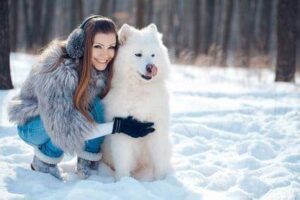
Samoyeds can be a good choice for first-time dog owners, but it depends on the individual owner’s lifestyle and ability to provide for the breed’s needs. Samoyeds are friendly, affectionate, and good with children, making them a great choice for families.
However, they also have a thick coat that requires regular grooming, and they have strong-willed personality that can make them challenging to train at times. First-time dog owners should be prepared to invest the time, patience, and resources necessary to provide proper training, socialization, and care for a Samoyed.
If you’re a first-time dog owner who is committed to providing a loving home and can meet the breed’s needs, a Samoyed can be a great choice. However, if you’re not prepared to make the necessary commitments, consider a different species that better fits your lifestyle and experience level.
Are Samoyeds easy to train?
Samoyeds can be trained, but they can be challenging for inexperienced trainers due to their independent and stubborn nature. Consistent and positive reinforcement techniques, patience, and persistence are fundamental to successfully training a Samoyed.
Establishing clear rules and boundaries with your Samoyed from an early age is also vital to promote good behavior. Training a Samoyed takes time, effort, and patience. They are intelligent dogs but can be stubborn, so a firm and consistent approach to training is essential.
Samoyeds respond well to positive reinforcement techniques, such as treats and praise, and it’s important to avoid using harsh methods or physical punishment, as this can damage the bond between you and your dog.
Socialization and early training are essential for Samoyeds, as they can be wary of strangers and unfamiliar situations. Obedience training and basic commands, such as sit, stay, and come, should be a priority, as well as crate training to help with housebreaking.
Do Samoyeds have a lot of energy?
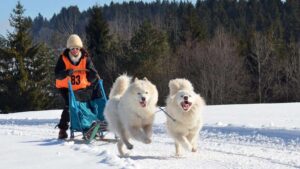
Samoyeds are a high-energy breed. They were originally bred for herding and guarding livestock, and their energetic nature is still evident today. They require a lot of physical exercises, such as long walks, runs, and play sessions, to keep them mentally and physically stimulated.
If a Samoyed does not receive enough exercise, it can become bored and destructive and may exhibit undesirable behaviors such as chewing or digging. Their owners need to provide enough physical activity to help them release their energy and maintain good health.
Are Samoyeds good with other animals?
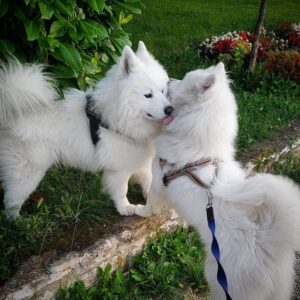
Samoyeds can be good with other animals, depending on their personality and early socialization. They were originally bred to work with other animals, such as livestock, so they tend to be good with other dogs and animals if appropriately introduced.
However, Samoyeds can be wary of strange animals without proper socialization and may act aggressively toward them. Early socialization and positive experiences with other animals can help ensure that your Samoyed is comfortable and friendly with other animals. Supervising them around other animals is also essential to ensure everyone remains safe and happy.
Do Samoyeds shed a lot?

Samoyeds are heavy shedders and have a double coat of fur that sheds twice a year. Their thick, fluffy coat helps them withstand cold temperatures, but it also means that they shed a lot of furs, especially during the spring and fall when they “blow” their coat.
Regular brushing can help control shedding and keep their coat healthy and shiny, but it’s important to expect some shedding, especially during heavy shedding seasons. Owners of Samoyeds should be prepared to vacuum and frequently sweep to keep the shedding under control.
Furthermore, Samoyeds are known for their thick, fluffy coat, which can shed quite a bit throughout the year, especially during the spring and fall. This heavy shedding is due to the change in seasons and the dog‘s natural process of losing and regrowing its coat.
You can manage the shedding with regular grooming, including brushing, which helps remove loose fur and prevent it from ending on furniture and clothing. Regular bathing can also help remove loose hair, but it’s crucial to avoid over-bathing, as this can dry out the skin and disrupt the natural oils in the coat.
In addition to brushing and bathing, a healthy diet and regular exercise can also help minimize shedding and keep your Samoyed coat healthy. It’s important to note that shedding is a natural part of owning a Samoyed, and while you can manage it, eliminating it is impossible.
Are Samoyeds good for apartment living?
Samoyeds could be better-suited for apartment living, requiring a lot of space and outdoor activity. They were originally bred for herding and guarding livestock, so they have a lot of energy and need plenty of room to run and play.
Samoyeds are also large dogs, with males weighing between 45 and 65 pounds and females weighing between 35 and 50 pounds, so they need a lot of space to move around comfortably.
If a Samoyed does not receive enough exercise and space, it can become destructive and bark excessively, which can be a problem in an apartment setting. Samoyeds are best suited for homes with a large yard or a rural setting where they can run and play to their heart’s content.
Do Samoyeds have a high barking tendency?
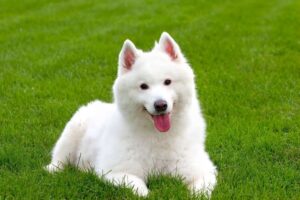
Samoyeds tend to bark frequently and loudly. They were bred as herding dogs and were used to alert their owners of potential threats or intruders, so barking is in their nature. Proper training and socialization can help manage their barking behavior.
However, Samoyeds have a strong urge to bark, and their deep, melodic bark can be quite loud. They bark to alert their owners of potential dangers, to express excitement, and to get attention. If you consider a Samoyed as a pet, be aware that they can bark excessively if they become bored, anxious, or not exercised enough.
Consistent training, socialization, and exercise can help reduce excessive barking and ensure that your Samoyed is a well-behaved and happy companion.
Are Samoyeds good watch dogs?
Samoyeds can make good watchdogs due to their protective and territorial nature. They have a strong instinct to alert their owners of anything out of the ordinary, and their loud bark can deter potential intruders.
However, it’s important to note that Samoyeds are naturally friendly dogs and may not be suitable as guard dogs. They tend to greet everyone, including strangers, with wagging tails and affection. Proper training and socialization can enhance their watchdog instincts while preserving their friendly and loving personality.
Samoyeds are generally known for being friendly, loyal, and affectionate dogs. They have a strong desire to please their owners and are eager to form close bonds with their families. This social nature can make them poor guard dogs, as they may need to be more aggressive to scare off intruders.
On the other hand, their natural watchfulness and protective instincts make them good watchdogs, as they bark to alert their owners of anything out of the ordinary.
Are Samoyeds good with strangers?
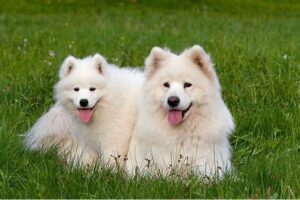
Samoyeds are generally friendly and affectionate dogs known for their love of people. They are usually good with strangers and are not naturally aggressive. However, like all dogs, it’s important to properly socialize a Samoyed from a young age to ensure they are comfortable around new people, places, and experiences.
This can help prevent any potential shyness or fearfulness in social situations and can also help reduce the likelihood of aggressive behavior. With proper socialization, a Samoyed will typically be a friendly, confident, and loving companion that welcomes new people with wagging tails and happy greetings.
Are Samoyeds good for cold weather?
Samoyeds are well-suited for cold weather. They were originally bred as sled dogs and herding dogs in the colder regions of Siberia and were developed to withstand harsh weather conditions. They have a thick, double coat of fur that provides excellent insulation against the cold, and their friendly and cheerful disposition helps them to stay warm and cozy in cold weather.
However, while Samoyeds are well adapted to cold weather, they still need proper care and protection to stay healthy and comfortable. This may include providing them with warm and dry shelter and adequate grooming to remove any matted or tangled fur that can trap moisture and cause discomfort. With proper care, a Samoyed can be a happy and healthy companion in even the coldest climates.
Do Samoyeds have a high grooming needs?

Samoyeds have high grooming needs due to their thick, double-fur coat. They shed a lot, especially during shedding season, and their thick fur can easily become matted or tangled if not properly groomed. Regular brushing is good for preventing matting, removing loose fur, and keeping their coat in good condition. Samoyeds also require occasional baths to keep their fur clean and shiny.
In addition to regular grooming, it’s essential to keep their ears clean and dry to prevent infections and to keep their teeth clean to prevent dental problems. Trimming their nails regularly will help prevent discomfort and maintain good foot health.
Proper grooming is essential for the health and comfort of a Samoyed, and it can also help to maintain the breed‘s distinctive appearance. If you are considering a Samoyed, be prepared to dedicate time and resources to grooming and keeping their coat.
Are Samoyeds good for seniors?
Samoyeds can be good companions for seniors, but it depends on their individual needs and circumstances. Samoyeds are friendly, loyal, and affectionate dogs; their cheerful and energetic personalities can bring joy and comfort to seniors. However, it’s important to remember that Samoyeds are also large dogs that require regular exercise and grooming, which may be challenging for some seniors.
When considering a Samoyed for a senior, assessing the old are the physical ability, energy level, living situation, and available resources for caring for the dog are essential. If the senior can provide the dog with adequate exercise, grooming, and attention, a Samoyed can be a great companion.
It’s also important to consider any health issues or mobility limitations that may affect the senior’s ability to care for the dog.
Sometimes, a smaller or less demanding breed better fit seniors. Choosing a dog that works well with your lifestyle and needs is always essential. Consulting with a veterinarian or animal behaviorist can also help you determine your best breed.
Conclusion
In conclusion, the Samoyed breed is known for its friendly, loyal, and affectionate temperament. They are outgoing and cheerful dogs that enjoy human companionship and form strong bonds with their families.
Samoyeds are generally good with strangers and other animals and are not naturally aggressive. They are well-suited to cold weather and have a thick, double coat of fur that provides excellent insulation against the cold.
However, they have high grooming needs due to their thick fur and require regular exercise and attention to stay happy and healthy. When considering a Samoyed temperament, assessing your lifestyle and ability to provide the necessary care and attention is vital. With proper training, socialization, and maintenance, a Samoyed can be a wonderful companion and bring joy and love to your life.

